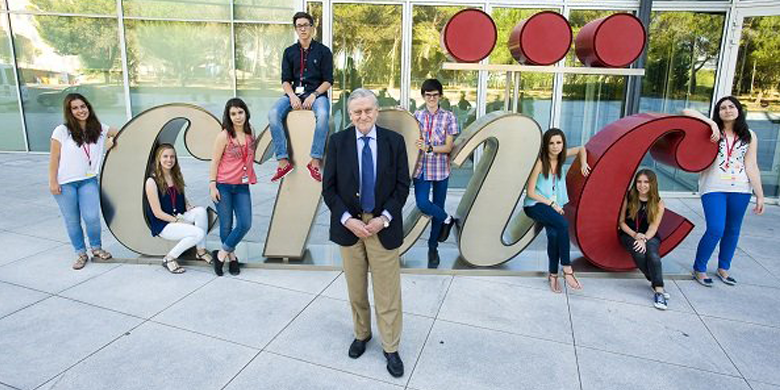From high-school graduates to physicians… at the CNIC
Julio César García Rubio and Eliú David Pérez Nogales first met at the CNIC back in 2007 and ran into each other again at the same center in 2015.
In these eight years, they have gone from being high-school seniors, graduating with the maximum grade average (10) in the Spanish bachillerato program, to practicing physicians in their first residency year. As they have grown in years and wisdom, both have retained a shared conviction: their admiration for the CNIC and its training programs, in which they have participated at various stages.
Eliú, from Gran Canaria, remembers how he came to participate in Acércate—the CNIC program aimed at the brightest school leavers with an interest in research—almost by accident. “I started a course option at school called ‘Science through Experiment’. It was a total flop because hardly any students took the course. But the course teacher told me about the Acércate program and suggested I apply.” What most impressed him about the selection process was the telephone interview in English. “In those days this was how they selected among the applicants who all had an overall grade 10 in the bachillerato; nowadays they do it by raffle draw.”
The telephone interview is something that also sticks in Julio’s mind. He received his call in his native Gijón, where he is now training as a cardiologist. This career path wasn’t planned back in 2007. “I was pretty clear that I wanted to work in research, and it was here at the CNIC that I changed my thinking and veered more toward the clinic.” When he first came to the CNIC he was planning to study Biotechnology rather than Medicine.
Eliú already had a clear vocation for medicine, but as yet didn’t have a clear idea of what area he would specialize in, and it was precisely at the CNIC that he set his heart on cardiology. But neither of the two was content to follow the standard training path, which is to say that neither of them has respected the traditional dichotomy between research and clinical practice.
Julio acknowledges that “when you first hang a stethoscope around your neck, it changes your outlook, you start to treat patients and what you really enjoy is the work in the clinic.” Precisely because he saw this happening, he decided to return to the CNIC in 2011, on the Cicerone program. “I had completed my fourth year and joined Ignacio Flores’s lab to do basic research; I wanted to rediscover something of the spirit of enquiry that seemed to have got lost during my degree studies.”
And, in effect, this return started him anew on that path. But neither Julio nor Eliú think that there should be such a stark choice between the bench and the clinic. Julio affirms that “ideally it should be straightforward to combine both elements, and one thing I’m clear about is that I don’t want to leave the clinic to work exclusively in research; I don’t want to give up anything, and even though I realize that achieving this professionally means giving up on free time, I think it’s time well invested.”
This chimes with Eliú’s view. “I knew from the start that I needed to do many things at the same time and that I would have to get into research of some kind, if not basic research then clinical research with patients. But I do want to combine both activities, and I’m prepared to give time up to do that.”
And it is precisely this commitment to getting the most out of both worlds that drove these two medics and future cardiologists to apply for another CNIC fellowship, eight years after the first, and in Julio’s case four years after the second.
Having lost contact over the years, the one-time Acércate participants are once more training together at the CNIC, as physicians enrolled on the RES@CNIC program. The nine intense weeks of this program have demonstrated that their dream is not impossible. Julio explains that “the program is also building the foundations for future multicenter studies, because graduates of the program are dispersed in centers throughout Spain. This is going to make it easier to recruit study participants from all over the country, because we and our fellow RES@CNIC graduates are more than ready to work in partnership with the CNIC. This is one of the key ideas of the program, to form lasting and direct links with hospitals in the Spanish health system.”
Collaboration is also what Eliú most valued about the program. “The program equips you with a great many tools to take back with you to your hospital, and these tools enable you to advance with your work in ways that otherwise would not have been possible.”
Julio defines RES@CNIC as a special program. “You arrive here with a clinician’s perspective, but in just a short time this perspective is changed. You leave with the conviction that a physician can also do research, something that seems difficult for colleagues in other specialties. With this program you realize that the two activities are compatible.”











